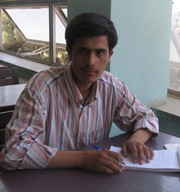About "a piece of paper on which it was written that I had been sentenced to death."
 A young Afghan journalist is now facing the death penalty for blasphemy, and it's just the latest incident in an ongoing campaign of intimidation against journalists in Afghanistan.
A young Afghan journalist is now facing the death penalty for blasphemy, and it's just the latest incident in an ongoing campaign of intimidation against journalists in Afghanistan.On Tuesday, Sayed Parwez Kaambakhsh was sentenced to death in a closed trial in a lower court in the northern region of Balkh. He was allowed no legal counsel. He wasn't even allowed to speak.
“It was about four p.m. when guards brought me into a room where there were three judges and an attorney sitting behind their desks. There was no one else,” Kambakhsh told the Institute for War and Peace Reporting (IWPR).
“The death sentence had already been written. I wanted to say something, but they would not let me speak. They too said nothing. They just handed me a piece of paper on which it was written that I had been sentenced to death. Then armed guards came and took me out of the room, and brought me back to the prison.”
Kaambakhsh, a third-year journalism student at Balkh University, reports for the Jahan-e-Naw newspaper in Mazar-e-Sharif. He was arrested last October on charges of distributing "anti-Islamic propaganda" in the form of an article that originated in Iran that questioned the legitimacy of the Koran's unequal treatment of men and women.
But Sayed Yaqub Ibrahimi, Kaambakhsh’s brother, says even that isn't true. Ibrahim, a law student at Balkh University, is also a journalist. He's a staff reporter for IWPR.
Observers say it may well be that the Afghan clerics who sentenced Kaambakhsh are in fact attempting to silence Ibrahimi, who has written critically of regional warlords and government officials. A recent report co-authored by Ibrahimi makes the case that after six years of slow but steady progress on the free-speech front in Afghanistan, 2007 turned out to be the worst year for the suppression of the press since the 2002 liberation.
Padraig Reidy, from Index on Censorship, has written a report here.
Kaambakhsh's case is at least getting some global attention now that the lower court verdict is in, but it certainly would be nice to hear some Canadian voices, particularly Stephen Harper's and those of the Opposition leaders, raised in protest. Our soldiers are not dying in that country to safeguard this kind of tyranny.
I first raised Kaambakhsh's case almost two weeks ago, to provide some context for all the hyperbole surrounding Ezra Levant's troubles, about which Alan Borovoy has now had more than a few intelligent things to say.
I'm a great admirer of Borovoy, with whom I notoriously share a nostaligia for "the memory of North America’s tough-minded democratic Left" as well as an antipathy to the hard-line, conservative approach to refugee claimants - an approach that casts such a wide net in the effort to keep Canada free of terrorists that it also excludes "asylum seekers who are legitimate freedom fighters from totalitarian regimes."
I'm still not 100 per cent convinced by his position on free-speech, though. I'm more inclined to the slightly different position set out here. Context is everything. But for now, at least, I'm going with Borovoy regardless. He's way, way smarter that I am.
Speaking of the proper context in which to place hyperbole about "state persecution" in Canada, can we please at least bear a thought or two next Wednesday for the dozens of student activists the thug regime in Iran has jailed in recent weeks?





4 Comments:
I side with Borovoy Gatekeeper. What course of action would you suggest? However small a contibution I can make, I am glad to offer it.
As for your nostalgia for old left-at 15 I joined the communist party - but really I just wanted to meet girls;)
"However small a contibution I can make, I am glad to offer it."
Talk it up(Sayed Parwez Kaambakhsh). Get people to write letters to Harper and the Opposition leaders.
Wish I could think of something more useful.
Thanks for asking.
Yeah, its not nearly as bad as the most egregious case in 21st century Afghanistan, eh?
With standards like that, you fellows really are hosed, eh?
Yeah, it's not nearly as bad for Franklin in any century. How lucky those standards are for you. Now, how about speaking up for those less fortunate?
Post a Comment
<< Home